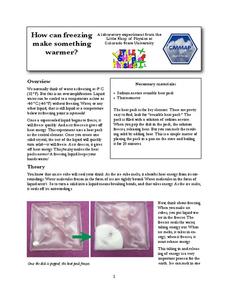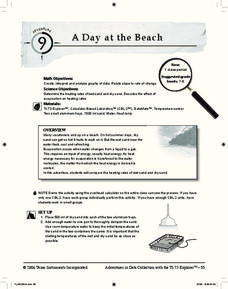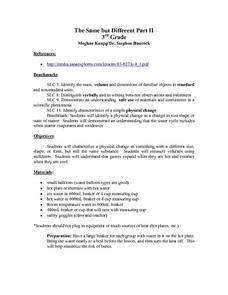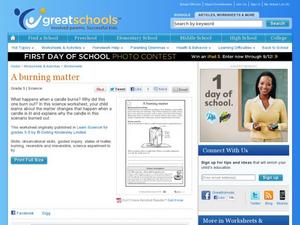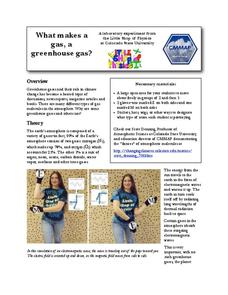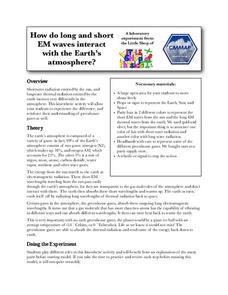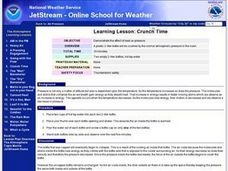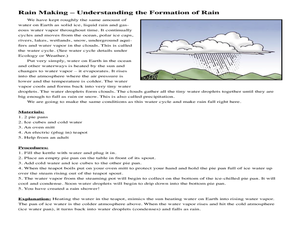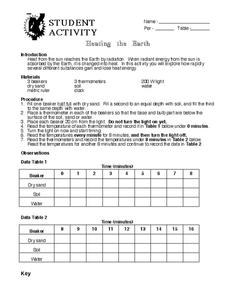Curated OER
Keeping Cool
Young scholars investigate the air conditioner units around the school. They chart the temperature by placing a thermometer in different situations and decide how to keep cool and save energy in the summer.
Colorado State University
How Can Freezing Make Something Warmer?
Crazy fact—freezing liquid actually gives off heat! Young scholars investigate the transfer of energy when liquids freeze using a chemical heat pack. The heat pack gives off heat as its liquid core freezes.
Weebly
Definitions of Conduction, Convection, and Radiation
There's quite a bit in this physical science packet. First, how is heat transferred? Learners read a brief explanation of conduction, convection, and radiation before identifying common occurrences (with pictures) as one of the three....
Curated OER
A Day at the Beach
Help learners determine the rate of change for the temperature of sand. They will collect data on the temperature of wet and dry sand over time with a heat lamp overhead. Then make a scatter plot of the data and find a linear model to...
Curated OER
The Same, But Different Part II
Learners characterize a physical change as something that changes to a different size, but retains its basic substance. They measure volumes using milliliters, and perform an experiment that proves that gases expand when hot and contract...
Curated OER
Determining the Molar Mass of a Gas
Young scholars determine the molar mass of a gas. In this molar mass of a gas lesson plan, students use the vapor density of an organic solvent to determine its molar mass. They vaporize the solvent and collect the vapor. Once it is...
Virginia Department of Education
States of Matter
Scientists have been studying exothermic reactions before they were cool. The lesson begins with a discussion and a demonstration of heat curves. Scholars then determine the heat of fusion of ice and the heat needed to boil water through...
Chymist
Determination of the Volume of CO2 in Pop Rocks
Where does the pop in pop rocks come from? An engaging activity asks scholars to measure the amount of carbon dioxide in a package of Pop Rocks candy. Learners dissolve the candy in water and use the solubility of CO2 to determine its mass.
DK Publishing
A Burning Matter
The process of fire requires oxygen, heat, and fuel. Take one of those away, and fire ceases to exist. That's the idea behind this worksheet which portrays a candle burning inside an upside down jar. Pupils answer a couple of questions...
Colorado State University
Can Boiling Make Something Freeze?
Use boiling as an avenue for freezing. Young scholars watch as liquid nitrogen removes heat from the ingredients for ice cream. As this happens, the nitrogen boils and the ice cream freezes—all in the same container. A little science magic!
Colorado State University
What Makes a Gas, a Greenhouse Gas?—The Carbon Dioxide Dance
Investigate a heated topic in environmental science. Scholars team up to play the parts of gas molecules in the atmosphere. As the teacher moves about, acting as the electromagnetic wave, learners react as their molecules would to the...
Colorado State University
How Do Long and Short EM Waves Interact with the Earth's Atmosphere?
Things are about to heat up in your classroom! A kinesthetic lesson asks learners to play the part of the gases in the earth's atmosphere and interact with the sun's radiation. The focus is to learn the impact of the increasing...
Curated OER
Ice Ain't Easy
Students are told that objects in contact with one another reach an equilibrium temperature. A hot object placed in a cool liquid always cool off. It never happens that the object gets hotter and cool liquid gets colder. Students predict...
Curated OER
Learning Lesson: Crunch Time
Students demonstrate the effect of heat on pressure. They use a 2-liter bottle and hot tap water to complete the experiments. They also discuss thunderstorm safety rules.
Curated OER
Energy
Pupils are introduced to the concept of energy. After observing a demonstration, they identify the sources of heat and the ways heat can change objects. In groups, they travel between stations to view different demonstrations dealing...
Curated OER
Rain Making - Understanding the Formation of Rain
Students read and conduct and experiment to learn about rain formation. In this water forms lesson, students read about the formation of rain and its purposes. Students then complete a rain experiment activity.
Curated OER
The Science of Weather: Humidity makes air feel even hotter.
Students examine the effects of heat and humidity. In this weather lesson, students read a chart to determine the effects heat and humidity can have on the human body. This lesson includes an optional extension activity using a newspaper.
Curated OER
Up, Up, and Away
Second graders observe the changes that water has when there is a change in a state of matter. In this lesson they observe the results of applying heat to water with the end result of conversion to a gas.
Curated OER
Chill Out
Students investigate Newton’s Law of Cooling. For this Algebra II/ Pre-Calculus lesson, students explore exponential regression as they conduct an experiment to simulate the temperature variations that occur as a liquid cools. The...
Curated OER
Deep Ocean Currents
Students observe the interactions of different temperatures of water using colored ice and a thermometer and then compare the results with global ocean current solar heating. They identify where floating ice would be found in the ocean,...
Curated OER
A Watched Pot Never Boils
Students determine how long it takes to bring a specific amount of water to a rolling boil. Students conduct this experiment at home with their parent or guardian. Students write down observations as the water begins to boil. Students...
Curated OER
Talking About Clouds
In this weather worksheet, students read a selection about the water cycle and cloud identification. Then the students fill in the missing words in 5 sentences and write the name of 5 cloud types while describing the clouds.
Curated OER
Waterwheel Work
Young scholars investigate the history of the waterwheel and common uses for water turbines today. They construct an experimental waterwheel using a two-liter plastic bottle, measure the rate of revolution of a waterwheel, and complete...
Curated OER
Heating The Atmosphere
In this science worksheet, students look for the answers to finding the correct temperatures that match the location in the atmosphere.



